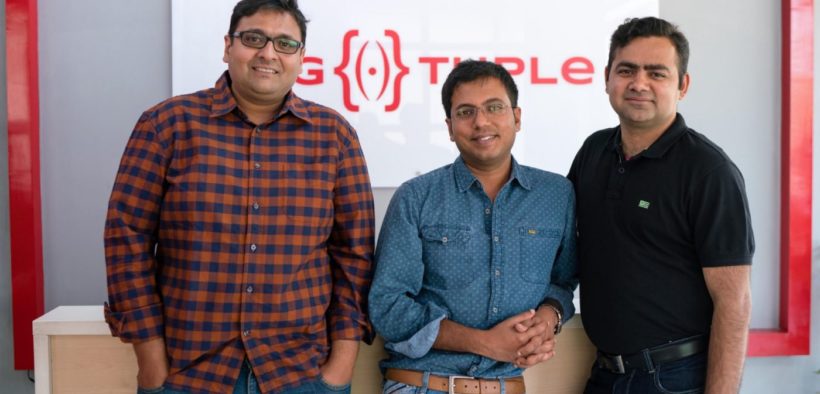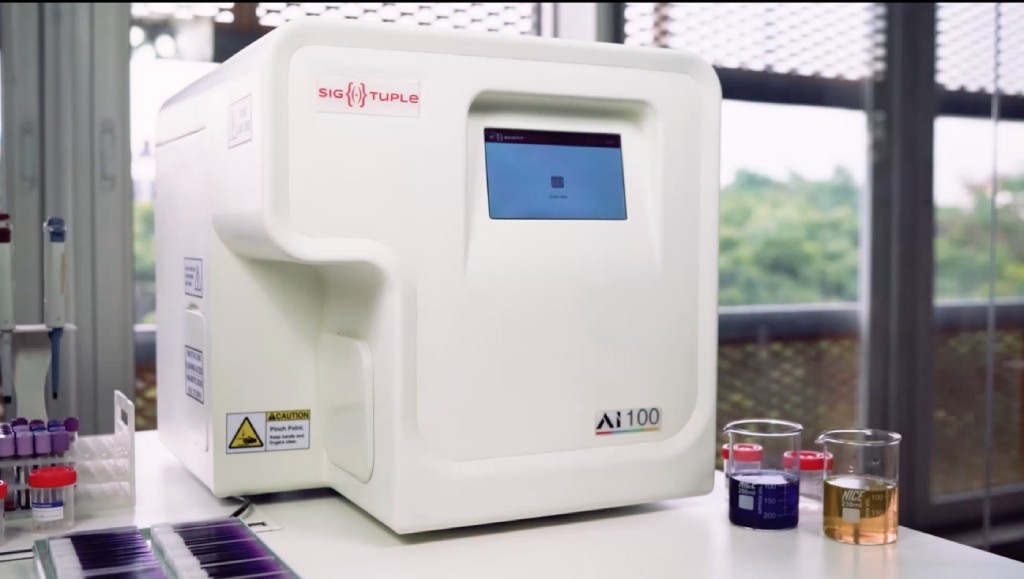Decoding The Numbers

Generating intelligence for healthcare using Artificial Intelligence is high up on Sigtuple’s agenda.
By Anila Mathew Vivek
sig tuple was born from an idea unheard of till then—trying to process the enormous amount of visual data generated in medical tests by using Artificial Intelligence (AI). Accuracy, accountability, and affordability are the three focal points for the healthcare firm, which won the Top Innovator Award in the Economic Times Startup Awards 2018. In 2012, Sigtuple founders Tathagato Rai Dastidar, Rohit Kumar Pandey and Apurv Anand were working with American Express Big Data Labs.
The three engineers were faced with the task of building a big data stack; this led to a search for an effective AI platform, which, in turn, acted as a catalyst in establishing one of India’s unique healthcare platforms.
Their idea led to incorporating Sigtuple in July 2015. By October, the start-up firm had raised funds to the tune of $740,000. Sigtuple began working on Manthana, it’s flagship platform that generates intelligence for healthcare. Named after the mythical episode of the churning of the celestial ocean, Manthana is equipped to handle five different screening solutions. It allows medical experts to gather data without having to physically depend on devices or biological samples constantly. Visual medical data from different devices are collated to build a longitudinal memory. Adhering to a hub-and-spoke model, it can also train, validate, and execute AI and Machine Learning-powered models to classify objects of interest, detect diseases and compute the metrics for reporting. Experts operate from hubs while devices can be installed in spokes.

Co-founder Anand explains: “Manthana was created, from grounds-up, to be a continuously improving, automatically upgrading platform which enables digitization, management, and analysis of visual medical data, trains various kinds of AI models on it, and provides an insightful, interactive report to medical specialists.”
Currently, Manthana is made up of Shonit, Shrava, Aadi, Dhristhi, and Vaksha that assist in the analysis of peripheral blood smears, urine microscopy, semen, retinal scans, and chest X-rays respectively.
Visual medical data from different devices are collated to build a longitudinal memory. Adhering to a hub-and-spoke model, it can also train, validate, and execute AI- and Machine Learning powered models to classify objects of interest, detect diseases and compute the metrics for reporting.
“We use Sanskrit words because we wanted to give our products an Indian flavor,” says Dastidar. “We are very proud of the fact that we are an Indian company, selling Indian products. Adi means beginning, Dhristhi means eyesight.” Shonit, which has undergone three clinical trials, is a holistic, peripheral blood smear analyzer that has automated routine tasks like differential blood counts as well as screens for parasitic infections. Shrava analyses urine to detect substances like crystals and casts, cellular material like epithelial cells, RBCs and WBCs, and other volumetric parameters. Aadi uses state-of-the-art AI techniques for sperm analysis to help measure factors like progressive motility, concentration, and morphological characteristics.
Also Read About
Dhrishti, which is in the process of being developed, uses computer vision and AI to identify and localize base pathologies and abnormal structures in both fundus and OCT scans. Vaksha is still under research and is a screening solution for digital chest x-ray images, which can identify abnormalities. Manthana uses a pay-per-use scheme for every report generated. The hardware comprises of a low-cost digital scanner that is required to convert the physical slide into a digital slide, which is then sent to Manthana. The digital slide is further analyzed and a detailed report is generated by the AI and ML models hosted in Manthana.
Such reports contain numbers as well as visual medical evidence for the reported metrics and can be accessed by medical experts in any part of the world through their devices.
“We Want To Be A Global Story From India And We Will Not Compromise On That. After Usfda, We Will Get European Approval In The Next Quarter Or So. With These Two Approvals, We Can Enter Any Developed Market.”
Rohit Kumar Pandey, Co-founder, Sigtuple
The significance of Sigtuple in revolutionizing medical care in the country, especially in rural areas, is proven by the fact that the firm managed to raise $19 million as funds, in Series B round. They are looking at raising $40-$50 million in Series C round too. Unconfirmed reports from inside sources say that discussions have been held with DST Global, PremjiInvest and Ratan Tata’s UC-RNT fund. Flipkart founder Sachin Bansal, who sold his stake in the company after the Walmart buyout, has a 3.5 percent stake in SigTuple, which he may increase via the next round of funding. Pandey concludes by sharing the future plans charted for the firm: “We intend to get USFDA approval soon, and that’s when pre-marketing efforts in the US will start. Some investors suggested that we set up a US subsidiary but we didn’t want to. We want to be a global story from India and we will not compromise on that. After USFDA, we will get European approval in the next quarter or so. With these two approvals, we can enter any developed market.”
















